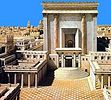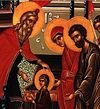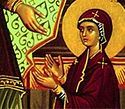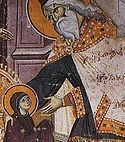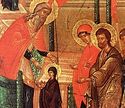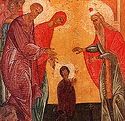

| Previous day | Next day |
| Old Style
November 21
|
Sunday |
New Style
December 4
|
|
24th Sunday after Pentecost.
Tone 7.
Рождественский пост. |
Fish, wine and oil allowed.
|
![]() The Entry of the Most Holy Theotokos into the Temple.
The Entry of the Most Holy Theotokos into the Temple.
New Hieromartyr Alexander Khotovitsky, protopresbyter, of New York and Moscow (1937).
Icon of the Most Holy Theotokos “Everlasting Hope.”
St. Columbanus, abbot, and founder of the monasteries of Luxeuil (Gaul) and Bobbio (Italy) (615).
Repose of Blessed Pasha of Birsk, fool-for-Christ (1891).
Thoughts for Each Day of the Year
According to the Daily Church Readings from the Word of God
By St. Theophan the Recluse

Twenty Seventh Sunday After Pentecost. [Eph. 6:10-17; Luke 13:10-17]
On the feast of the Entry of the Most Holy Mother of God into the Temple, “Christ is born” is first sung, preparing believers for a worthy meeting of the feast of Christ’s Nativity. Having understood this inspiration, act according to it. Delve deeply into the mystery of the incarnation of the Only-Begotten Son of God, ascend to its beginning in the pre-eternal counsel of God concerning the existence of the world and man in it, see its reflection in the creation of man, meet joyfully the first tidings of it immediately after the fall, trace rationally its gradual revelation in Old Testament prophesies and prefigurations. Understand how and who prepared to receive God incarnate, under the influence of Divine educational institutions and activities within Israel—pass, if you want, across the borders to God’s people and gather there rays of God’s light, shining in the darkness—and ponder to what degree those chosen from among all nations reached the presentiment of the unusual manifestation of God’s providence for people. This will be a mental preparation. But now the fast has begun—collect yourself in order to prepare for Communion, go to confession and take Communion with the Holy Mysteries of Christ: this will be an active and living preparation. If, on account of all this, the Lord grants you to feel the power of His coming in the flesh—then, when the holiday comes, you will celebrate it not out of a joy foreign to you, but one of your own flesh and blood.
Twenty Sixth Sunday After Pentecost. [Eph. 5:9-19; Luke 12:16-21]
Having spoken the parable about the man who became rich and planned to just eat, drink and be merry, and for this was struck with death, not remaining alive for the supposed pleasures, the Lord concluded: So is he that layeth up treasure for himself, and is not rich toward God. “So”—that is, such occurs, or such a lot befalls both these and others. Those who become rich and forget about God only think about pleasures of the flesh. Let those who desire to avoid this bitter lot “lay up” not “unto themselves, but be rich only toward God.” Since riches come from God, then devote them to God when they flow, and holy riches will come of it. Divide all surplus with the needy: this will be the same as returning to God what was given by God. He who gives to a poor person gives to God. Seemingly exhausting his riches, such a person becomes truly rich—rich through good deeds, rich for God. In pleasing Him he becomes rich in God, and by attracting His good will, he becomes rich from God, Who makes one who is faithful over a few things, ruler over many things. He becomes rich toward God, and not toward himself, for he does not consider himself to be master of the house, but only a steward and accountant, whose entire concern consists of satisfying all who come to him in need. But he fears spending anything in particular on himself, considering it to be an improper usage of property entrusted to him.


